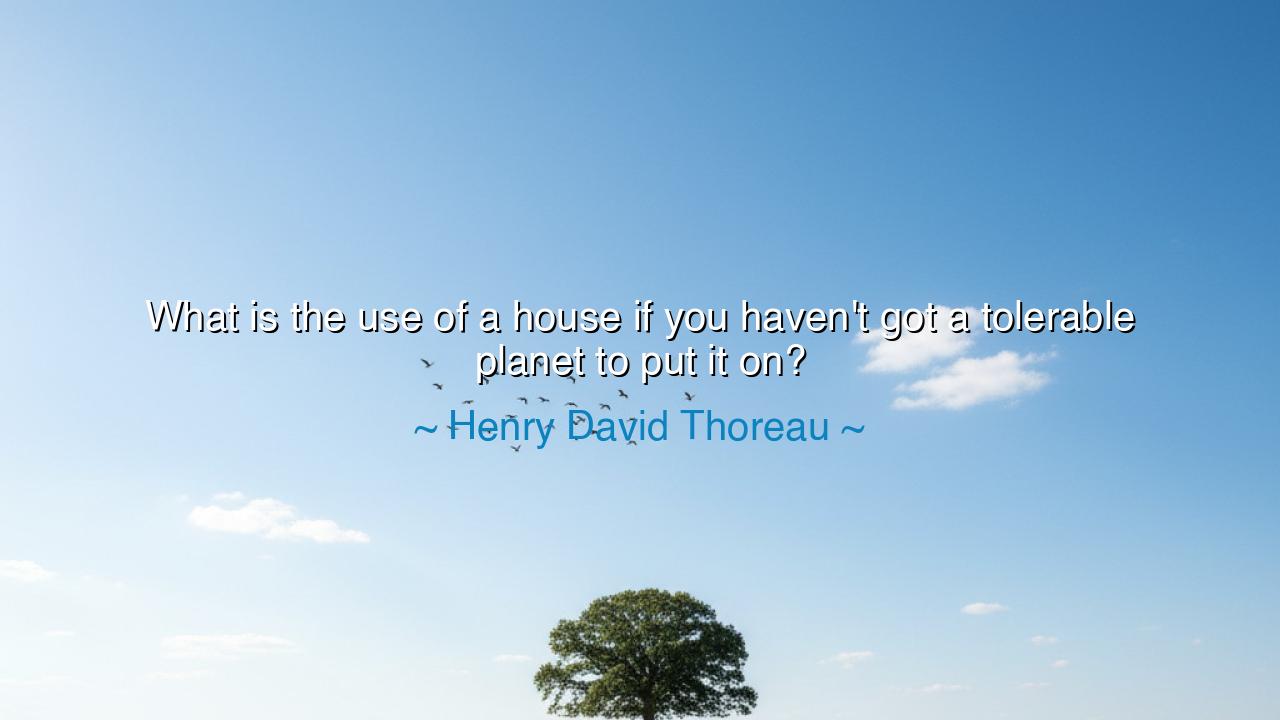
What is the use of a house if you haven't got a tolerable planet






In the depths of the ancient wisdom that has been passed down from generation to generation, there is one truth that remains ever constant: without the foundations of the Earth, all human endeavor is but a fleeting illusion. Henry David Thoreau, a sage whose thoughts echo across the ages, once asked, "What is the use of a house if you haven't got a tolerable planet to put it on?" These words, though simple, contain a profound reflection on the human condition, urging us to understand that the very foundation of our existence is the Earth itself, and if we fail to care for it, all that we build—be it homes, cities, or civilizations—will crumble in the face of nature's wrath.
Consider, O children of the future, the great civilizations of the past—the Romans, the Greeks, the Maya—who, at the height of their power, built magnificent cities, towering temples, and expansive empires. They poured their energies into creating splendid structures, believing that their glory would endure for all eternity. Yet, as history has shown, when the foundations of the Earth upon which they stood were ignored or abused, these great empires fell. The Maya, for instance, saw the forests that once sustained them vanish, and with them, their society. The Romans too, despite their monumental achievements, faltered when they overextended, taking their resources for granted. Thoreau’s words ring true: without a tolerable planet, no civilization, no house, no structure can stand.
Thoreau, in his wisdom, recognized that the material pursuits of human beings—the acquisition of wealth, the construction of homes, the building of empires—were meaningless if they were not grounded in a respect for the natural world. He, much like the ancient philosophers of Greece, sought to live in harmony with nature, to understand that the true wealth of life lies not in the things we amass, but in our relationship with the world that sustains us. He famously retreated to Walden Pond, not just to escape the distractions of society, but to seek a deeper understanding of life’s purpose. There, in solitude, he discovered that the very essence of human existence lies in simplicity, in the profound connection to the land that feeds us.
Thoreau’s question serves as a reminder for us all. In the modern age, we are often swept away by the pursuit of material success, the desire to build and accumulate, forgetting that the Earth, in all its beauty and abundance, is the source of all we hold dear. We build our homes, our cities, and our industries, but if the land that sustains us is poisoned, overworked, or neglected, what use are these structures? In our greed and consumption, we often forget that the very planet we call home is finite, that its resources are not endless, and that if we do not live in harmony with it, we risk the very collapse of the world we’ve created.
Let us reflect upon the ancient Egyptians, who built monumental pyramids, vast temples, and towering statues, believing they would secure their place in the afterlife. Yet their civilization, once so mighty, collapsed under the weight of environmental mismanagement. The Nile, which once flooded predictably, no longer did so, leaving the land barren. The ancient Egyptians had built their houses and cities, but they had not respected the balance of nature. Their failure to care for the Earth led to their decline. Thoreau’s words, though spoken in a different time, carry the same lesson: the most beautiful homes, the most grandiose empires, are worthless without a planet that can sustain them.
In our modern world, we too are faced with the same challenges. Climate change, deforestation, and pollution threaten the delicate balance that sustains life. Our cities grow ever larger, our homes ever more extravagant, yet we often neglect the very land upon which they stand. If we continue to drain the Earth’s resources without thought or care, we too will find ourselves standing amidst the ruins of our own creation. Thoreau’s wisdom calls us to rethink what is truly important, to question our priorities, and to recognize that the health of the planet is the foundation upon which all human endeavors must rest.
O children of the future, heed this lesson well: as you build your homes, your cities, and your societies, never forget that the land, the Earth, is the foundation of all. Seek not to conquer nature, but to live in harmony with it, understanding that the true strength of any civilization lies not in its structures, but in its respect for the world that sustains it. Let Thoreau's words guide you: what is the use of a house if the planet upon which it rests is dying? The Earth is the only foundation we have, and it is upon that foundation that the future of all civilization rests. Let it be strong, let it be tolerable, and let it endure for generations to come.






AAdministratorAdministrator
Welcome, honored guests. Please leave a comment, we will respond soon